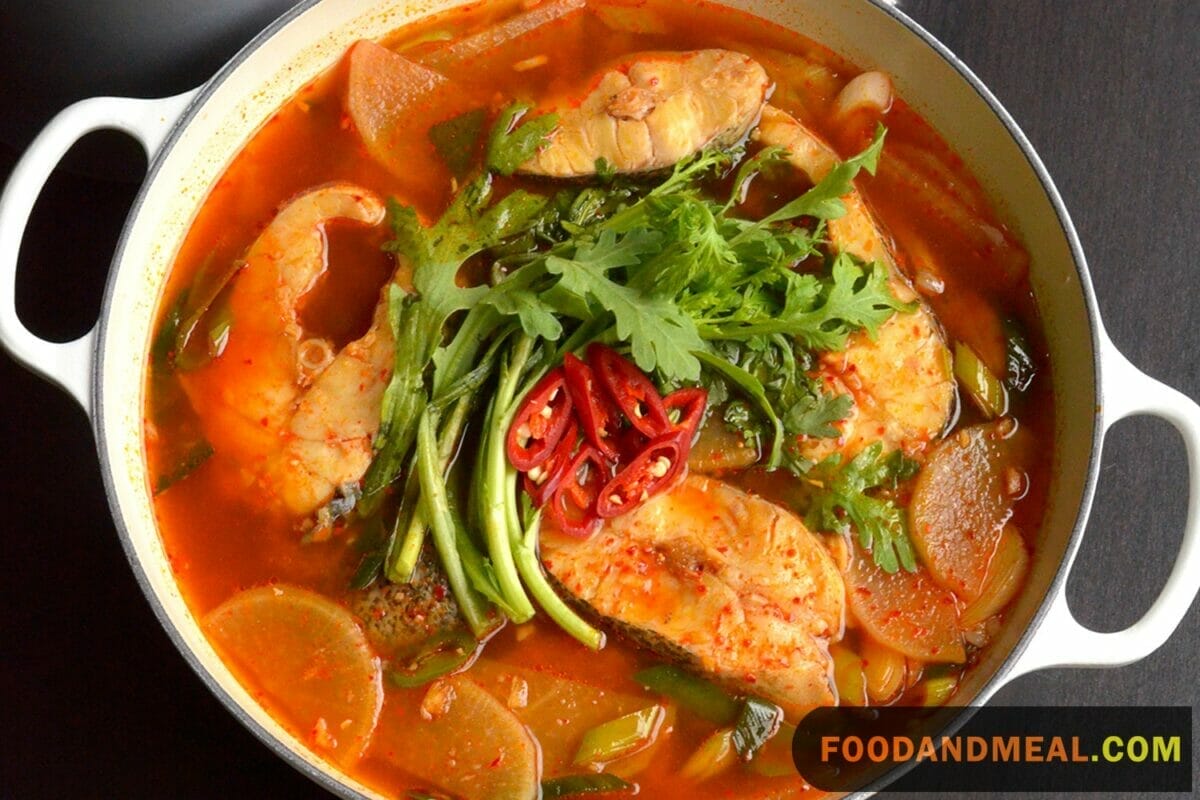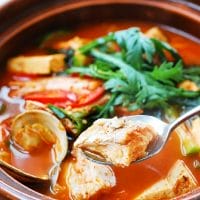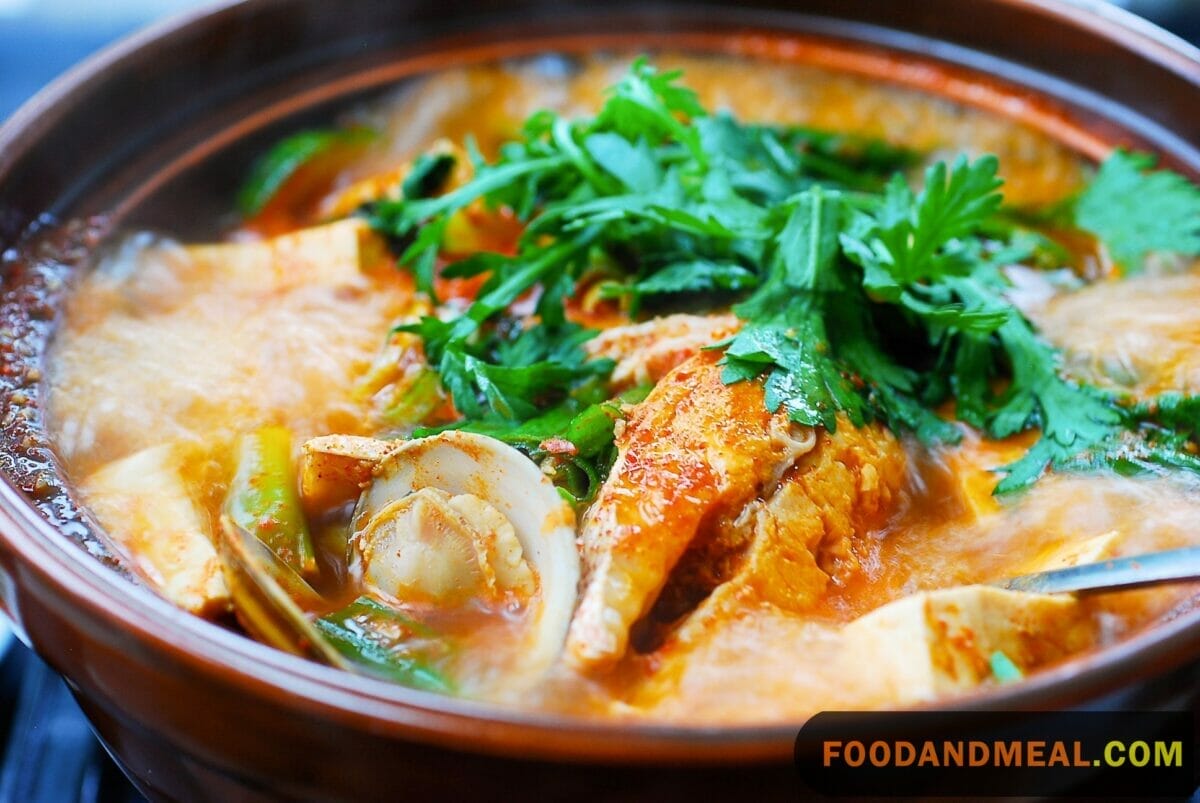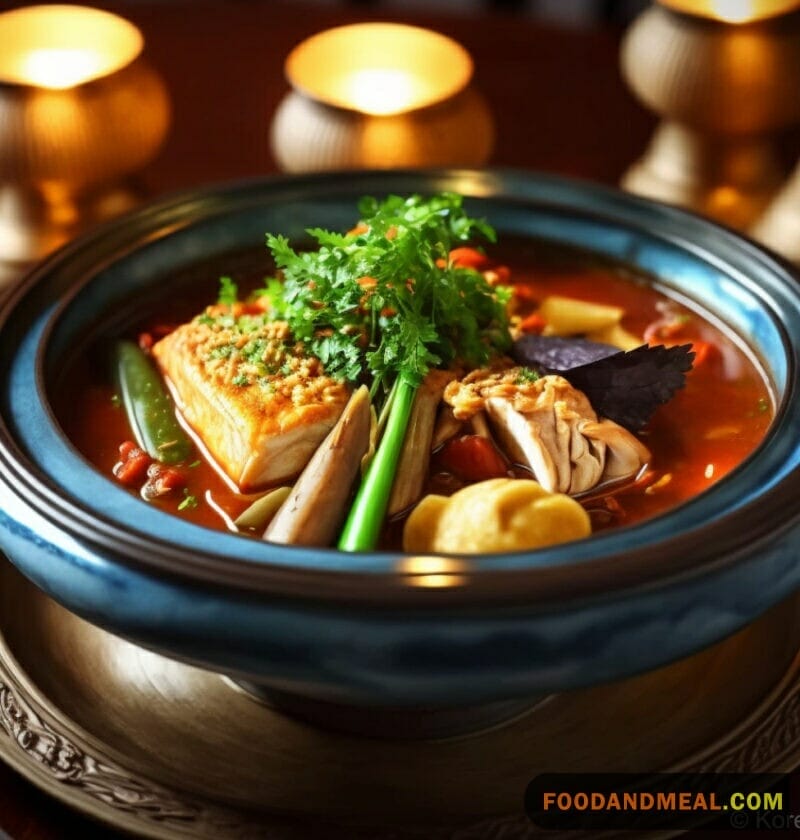As the gentle hum of the evening settles in, I find myself wandering back to a cherished memory, one that always surfaces with a particular blend of spices and warmth. It’s the essence of comfort, interwoven with the thread of culture, that brings me to the kitchen to recreate a dish that speaks of home: Spicy Cod Stew.
Working here at Food And Meal has allowed me the pleasure of exploring various cuisines, telling stories through flavors, and connecting with people over the shared language of food. And yet, sometimes, it’s the simple recipes from our past that resonate with us the most, isn’t it?
On a day filled with grey clouds and crisp winds, when the world outside seems a touch too brisk, the thought of diving into the hearty embrace of a spicy stew seems nothing short of inviting. It’s on days like these that I long for the warmth that this dish promises, a warm hug in a bowl that has the power to transform a chilly evening into one of solace and zest.
Spicy Cod Stew, or as I like to call it, the symphony of the sea, is my go-to for those moments when the soul yearns for a touch of heat tempered with the soothing notes of tender cod. There’s something about the way the flavors meld together—the warmth of the spices, the heartiness of the potatoes, and the delicate cod that flakes at the slightest touch—that creates more than just a meal; it’s an experience.
The desire to share this dish with you comes from a place of joy and nostalgia. Each ingredient is a verse in a poem of my heritage, a narrative that I’m eager to share through the universal love for good food. This Spicy Cod Stew isn’t just a recipe; it’s a piece of my history, a morsel of the legacy that I cherish and carry within me.


SPICY COD STEW
Equipment
Ingredients
- 1 whole cod, filleted and the head separated
- 8 ounces Korean white radish or daikon, peeled and cut into 1-inch pieces
- 2 garlic cloves, chopped
- 1 red Korean chile (or Spanish), halved and seeded
- 1 green Korean chile, halved and seeded
- 1/2 sweet onion, sliced into strips
- 1 tablespoon gochugaru
- 3 tablespoons gochujang or gluten-free gochujang
- 1 tablespoon soy sauce or gluten-free soy sauce
- 2 scallions, cut into 1-inch pieces
- Salt
- Freshly ground black pepper
- 1⁄2 (12- or 14-ounce) block firm tofu, cut into large cubes
- 4 ounces edible chrysanthemum leaves
- 1/2 zucchini, halved lengthwise and sliced
Instructions
- Cut the cod into several pieces.
- In a medium pot over medium-high heat, bring 31⁄2 cups water and the fish head to a boil. Reduce the heat to medium and add the radish, garlic, red chile, green chile, onion, gochugaru, gochujang, and soy sauce. Cook for 5 to 6 minutes. Don’t stir too much while the stew is cooking to keep the broth clear.
- Season the broth with salt and pepper.
- Remove the fish head and discard. Add the fish pieces to the broth and simmer until the fish is tender, 3 to 4 minutes.
- Add the scallions, tofu, chrysanthemum leaves, and zucchini and simmer for 2 to 3 minutes more. Do not stir anymore after this point. Season with salt and pepper.
Video
Notes
SUBSTITION TIP: If you can’t find chrysanthemum leaves, you can substitute watercress or even spinach.
Nutrition
© Food And Meal
This website provides approximate nutrition information for convenience and as a courtesy only. Nutrition data is gathered primarily from the Spoonacular Database, whenever available, or otherwise other online calculators.
Cooking tips

When preparing Spicy Cod Stew, the freshness of the cod is paramount. Seeking out the freshest fish can sometimes feel like a treasure hunt, but the resulting sweetness and flaky texture it imparts is simply irreplaceable in the stew. I always recommend visiting a trusted fishmonger or market early in the morning when the catch is most fresh. It’s a practice that fills one with anticipation and a connection to the dish that starts even before the cooking begins.
Spice forms the vivacious soul of the stew. The level of heat is a delicate balance and deeply personal. Some may prefer a gentle warmth, a slight tickle on the palate, while others yearn for a bolder fiery kick that stands up boldly to the robust flavors. Gochugaru (Korean red pepper flakes) is traditional and offers a depth that is more than just heat; it is a rich canvas of flavor. Adjusting these spices feels almost like composing music – you’re coaxing out harmonies and discovering the crescendos in the dish as you go.
Vegetables, like Korean radish (mu) and napa cabbage, contribute an earthy sweetness that counters the heat with grace. They also add a satisfying texture that complements the tender cod. As the vegetables simmer and soften, they release their essence into the broth, tying the stew together in a celebration of flavors. It’s almost as if they are the quiet peacemakers in the vibrant revelry of spices.
Balance is crucial in Spicy Cod Stew. A tip that I hold dear is to introduce the ingredients in stages, allowing each component to express itself without overpowering the others. This careful layering is akin to nurturing a relationship – patiently building, giving attention to each part, and understanding how they interact to create something beautiful.
Then comes the final flourish, the addition of tofu and fresh greens like scallions or perilla leaves. These not only add color and freshness to the presentation but offer a soothing counterpoint to the stew’s complexity. The tofu, with its soft neutral flavor, provides a comforting reassurance amidst the riot of flavors.
Serving suggestions

For a Japanese-inspired fusion, consider serving the stew alongside Sui-Gyoza Soup, combining the spicy seafood richness with savory dumplings. Alternatively, introduce a refreshing element with Guacamole Salad, where the creamy avocado and zesty notes provide a cool counterbalance to the stew’s heat. Experience authentic Japanese flavors by pairing the Spicy Cod Stew with Kotteri Tsukemen, allowing the rich dipping noodles to enhance the overall taste. For a delightful fusion, Bacon Enchiladas offer a mouthwatering blend of smoky bacon and spicy cod. To create a well-rounded meal, accompany the stew with Vegetarian Gyoza, introducing a light and savory touch. Finally, cleanse your palate with a Pineapple Granita, providing a sweet and icy finish to balance the boldness of the cod stew.
FAQs: Spicy Cod Stew Korean Recipe

- Can I adjust the spice level? Absolutely! The spice level can be adjusted by increasing or decreasing the amount of gochugaru (Korean red pepper flakes) you use. Start with a smaller amount if you’re sensitive to heat and gradually add more to achieve your desired spiciness.
- Can I use other types of fish? Yes, you can adapt this recipe to your taste. While cod is a popular choice for its firm texture and mild flavor, you can substitute it with other white fish like haddock, pollock, or halibut.
- Can I make this stew vegetarian? Certainly! To make a vegetarian version, omit the fish and replace it with tofu or mushrooms. Use vegetable broth and adjust the seasoning to your preference.
- Can I freeze leftover stew? While it’s possible to freeze leftover stew, the texture of fish can change after freezing. If you plan to freeze it, remove the fish before freezing and add it back when reheating. Keep in mind that the broth might thicken upon freezing.
- What’s the best way to reheat the stew? To reheat the stew, gently warm it on the stovetop over medium heat. Be cautious not to overheat, as the fish can become tough. If the stew thickens upon reheating, you can add a splash of water or broth to adjust the consistency.
- Can I adjust the vegetables used? Absolutely! Feel free to experiment with different vegetables. Carrots, zucchini, and mushrooms are excellent options. Just ensure to adjust the cooking time based on the vegetables you choose.
Conclusion
Seasoned black soybeans, a staple in Asian cuisine, are renowned for their robust flavor profile and versatility in dishes, making them not only an excellent ingredient in culinary adventures but also a nutraceutical one. Rich in proteins, fibers, vitamins, and minerals, these legumes serve as a powerful ally for health-conscious individuals and those managing dietary restrictions such as diabetes or heart disease. Their ability to be incorporated into myriad recipes allows for creative freedom in the kitchen, whether one is crafting traditional fare like the Korean jangjorim or innovating with contemporary fusion dishes.
In terms of meal planning, seasoned black soybeans can be the cornerstone of both daily eating habits and special occasion menus. For everyday meals, their ease of preparation can be appreciated; they can be prepared in large batches and added to salads, stews, or rice, providing a satiating and nutritious component that keeps well for several days. Conversely, for those looking to impress at a dinner party or festive event, these beans can be transformed into elegant appetizers or complex main courses that are sure to intrigue any palate.
A resourceful site to explore for both traditional and innovative recipes incorporating seasoned black soybeans is FoodAndMeal.com. This food blog offers a treasure trove of culinary ideas, from the beginner cook to the seasoned chef, highlighting the adaptability of these soybeans. With step-by-step instructions, nutritional information, and beautiful photography, FoodAndMeal.com makes incorporating seasoned black soybeans into one’s cooking repertoire an exciting and accessible Understanding the journey.
Hi! I'm Nazia of ‘Nazia Cooks’, a self-taught baker and cook residing in Chennai. Rooted in the rich South Indian culinary landscape, my palate has expanded to embrace global flavors. I revel in crafting fusion dishes, melding traditions to birth unique tastes.

